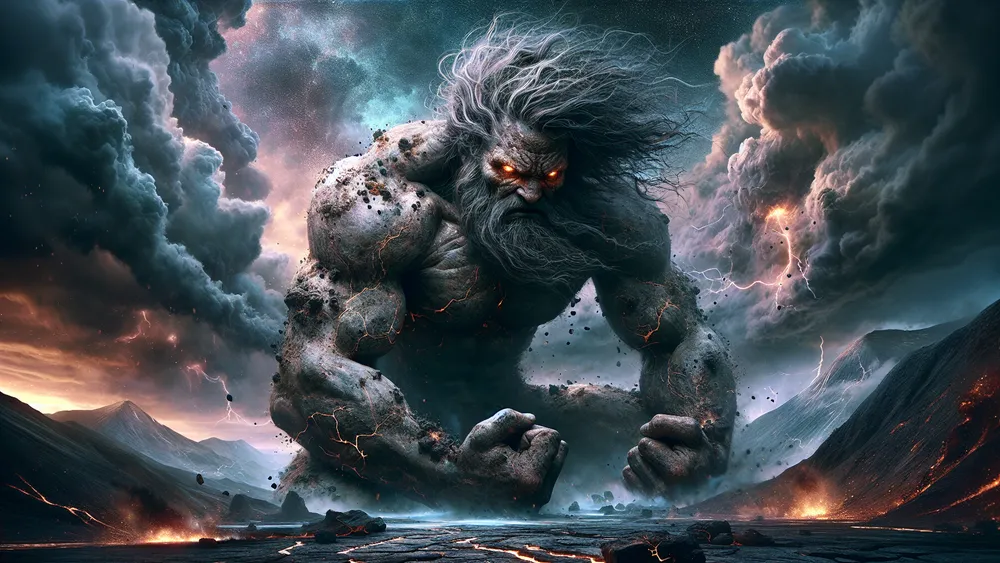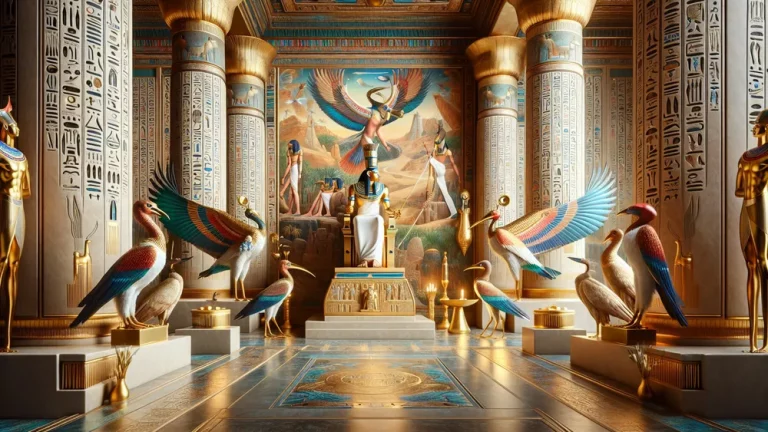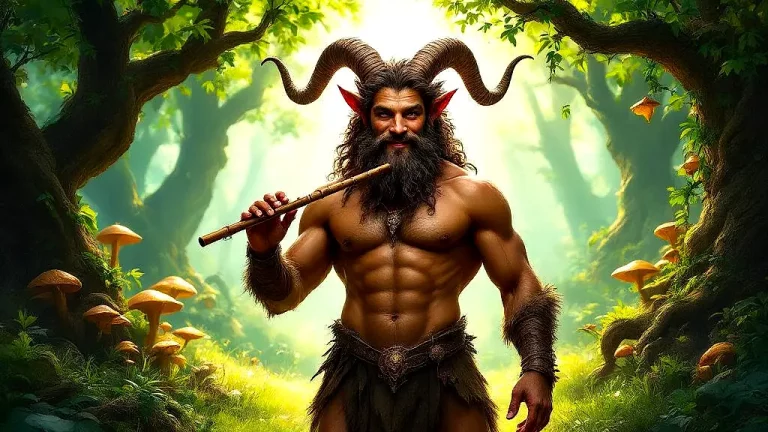Menoetius: Greek Titan Of Rashness And Violent Anger
In the big story of Greek myths, the Titans are strong figures, showing beginning forces and emotions that link to what people feel. Among these ancient ones, there is Menoetius, a Titan that means the raw and sometimes hurtful power of rushing and wild anger.
Key Points:
- Menoetius is a Greek Titan known for his rashness and violent anger.
- His name means doomed might or ruined strength.
- He is the son of Titans Iapetus and Clymene.
- Menoetius has three brothers: Prometheus, Epimetheus, and Atlas.
- He fought in the Titanomachy but lost to the Olympian gods and was sent to Tartarus.
- Menoetius represents the dangers of acting too quickly and uncontrolled feelings.
- His story serves as a warning about pride and the need for self-control.
Picture a storm that seems to happen out of nowhere, with strong winds and dark skies that appear suddenly – this is like Menoetius, being a force of quick fury that is big and scary. While you learn about Menoetius, you will see the details of who his family is, what he did in the big fight of the Titans, and how people in old Greek times saw his traits.
This start is a way to know not just Menoetius himself but also the wider picture of Titans and how they continue to be important in these myths.
Menoetius: Overview and Key Facts
| Key Part | Details |
|---|---|
| Name | Menoetius |
| Name Meaning | From Greek. It means “doomed might” or “ruined strength” |
| Who His Parents Are | He is the son of Iapetus and Clymene (or Asia), so he is a Titan |
| Brothers | Prometheus, Epimetheus, and Atlas |
| Role in Stories | He is about being rash and very angry |
| His Part in Titan Fight | He fought with the gods of Olympus but lost and got sent to Tartarus |
| What He Represents | He means the problems of acting too fast and not controlling feelings |
| Importance to Culture | Myths use him to teach lessons about what happens if you get too mad |
| Art Depictions | Hardly ever appears, but sometimes is found in stories of the Titanomachy |
| Appears in Books | Hesiod did mention this in “Theogony” |
Where Menoetius Came From
To really get Menoetius and his part in Greek myths, you need to look into where he started and the ties he has within the Titan group. For understanding what he means, think about his background that forms who he is and how he fits with others.
Menoetius in Greek Mythology
In the complex story of Greek myths, Menoetius is a critical one among the Titans, who came before the Olympian gods. Being the son of Iapetus and Clymene (or Asia), Menoetius belongs to a strong family that includes his brothers Prometheus, Epimetheus, and Atlas.
Think about a get-together where each person shows a different side of what people are like – Prometheus showing foresight and cleverness, Epimetheus with his looking back and not remembering, Atlas with his strength and not giving up, and Menoetius with his quick anger and wanting to jump into things. This family way reflects the different traits the Titans meant in these old stories.
While with other Titans and gods, he showed his fiery mood, and this marked his big part in the Titanomachy, which was a big fight between the Titans and Olympians. His story means the hard ties and traits shaping those myth stories, giving an idea about how people in old Greece saw emotions and ways of acting.
Menoetius, a Titan and brother to Prometheus, Epimetheus, and Atlas, represents quick anger and impulsiveness, playing a significant role in the legendary battle between the Titans and Olympians.
What’s in a Name?
The name Menoetius comes from Greek words and this gives an idea of his character and part in myths. With the Greek words “menos,” meaning “might” or “force,” and “oitos,” meaning “doom” or “ruin,” Menoetius’ name is understood as “doomed might” or “ruined strength.” This name means his natural rush and wild anger, as if a sudden action happens. So you get how his name matters, look at the key points below, which mean his traits:
- “Menos” (Might/Force): Stands for the raw strength Menoetius has, like nature’s power.
- “Oitos” (Doom/Ruin): Means the bad result when he acts too fast, leading to his fall.
- Combined Meaning: How these words come together stresses the double side of strong and breaking, a theme in Greek myths.
With this word origin view, Menoetius’ name is a reminder of the dangers when emotions and actions are not kept in check.

Menoetius’ Part in the Titanomachy
In the big story about Titanomachy, Menoetius was key as one of the Titans against the Olympian gods. This big family fight, where the older Titans, led by Cronus, were against the younger Olympians with Zeus, began. Menoetius being quick to act and very angry, fought hard next to other Titans.
Imagine a place where different ideas and powers were fighting, Menoetius running into the fight because that was how he acted. He was strong, not giving up, meaning the true idea of his name – doomed might. Though the Titans were strong, the Olympians, using smarts and working together, got ahead. After the fight was almost over, what happened to him was because he acted too quickly.
Zeus, with his big thunderbolt, struck Menoetius down, sending him to Tartarus, a dark place for the Titans who lost. This was not just because he lost; it also showed what happens when anger and acting on impulse are not checked. Menoetius’ fall is a warning about pride and what happens when the gods’ rules are broken.

Through this myth view, Menoetius’ story shows how the Greeks understood keeping power and control in balance, an idea found in many of their myth stories.
Traits and Meanings
After looking at Menoetius and what he did in the Titanomachy, let’s look closer at the traits that made him who he was and the meanings those had in the old Greek way of life. What do they tell us?
Signs of Impulsiveness and Fury
Menoetius stands as a perfect example of rashness and violent anger in Greek stories. You see these traits in how he acted, and what happened to him in the end. Think about something small that suddenly bursts; this means his quick nature, as he often acted without thinking of what might happen next, moved by strong heat inside.
With his anger, it was not just personal, but a big part of how he decided things and dealt with other Titans and gods. Participating in the Titanomachy, he rushed into the fight against the Olympians.
Brave yet not holding back, this made him lose in the end since his lack of control over anger led to losing, and Zeus punished him. Through these tales, not only are Menoetius’ traits seen as his own, but also as warning signs, meaning that the people of old Greece recognized the harm in unchecked feelings.
What Menoetius Stood for in Ancient Greece
In ancient Greece, Menoetius wasn’t just a myth figure; he meant the dangers of unchecked emotions and what happens when people act too quickly. Like a serious event showing risks, he became a warning story. The Greeks used his tale to mean why self-control was important, things they valued a lot.
His rash and very angry ways were not just his own flaws but typical of the larger human fight with too much emotion causing chaos. By having these traits, Menoetius was a strong reminder of needing balance between strength and wisdom, an idea that was important in Greek moral teaching.

To understand more about Menoetius’ symbolic role, let’s look at how his traits meant moral lessons in ancient Greece:
- Rashness as a Warning: Acting quickly without thinking showed the risk, teaching how careful thinking is important.
- Anger as a Cautionary Tale: His strong anger showed the bad side of uncontrolled feelings and why keeping emotions in check was needed.
- Downfall as a Moral Lesson: Losing and getting punished showed what happens with too much pride and going against the gods, meaning why being humble and respecting gods was crucial.
Through these meanings, Menoetius’ story fit into Greek culture, being a clear lesson about the good of moderation and the problems with too much.
Menoetius symbolizes the dangers of acting on strong emotions without self-control, serving as a vital lesson in the importance of balance between strength and wisdom in ancient Greek culture.
How Menoetius Stacks Up Against Other Titans
Think of Menoetius and other Titans as a group with their different features and roles in myths. He is known because he is rash and often angry, which is not like Titans such as Prometheus, who is known for being wise and thinking ahead.
Menoetius means having unchecked emotions is dangerous, while Prometheus stands for clever thinking, especially when he went against Zeus to bring fire to people. Another Titan, Atlas, shows strength since he holds up the sky as a result of his part in the big battle called Titanomachy. But, Menoetius, who often acted quickly, ended up defeated and locked in a place called Tartarus.
Moreover, Titans all share a rebellion against the Olympian gods, each one meaning different sides of power and what happens because of it. These comparisons make Menoetius’ special features stand out, giving a better view of his place in the Titan group.
Menoetius in Stories and Art
We have looked at Menoetius’ features and his place with the Titans; we will now focus on how his story appears in old writings and art.
How the Ancients Wrote About Him
They often see Menoetius in old Greek writings as a figure that warns us, with authors like Hesiod meaning his main traits teach lessons. In the book “Theogony” by Hesiod, he appears as a sign of hubris and rebellion, and his name itself suggests he is doomed because of his reckless nature. This means like when a storyteller talks about a character’s flaws to warn people about not controlling emotions.
Other old writers spoke of Menoetius too, mostly about his part in the fight of Titanomachy and what happened after Zeus punished him. It shows what can happen if one challenges the divine way. Through these descriptions, his story becomes part of Greek mythology, reminding us about the importance of temperance and humility.

How Artists Have Shown Him
Art often shows Menoetius in ways that stress his strong and wild side, just like how a movie today might use sound and light to highlight a character’s strong nature. On pottery, he might appear in battles like the Titanomachy, where his aggressive posture and looks mean his fighting and anger.
These artworks mean more than just art; they tell stories and teach lessons we learn from Menoetius. Sculptures, not as many, show his strong build, meaning his natural strength and quick energy that made up his character. These were not only to look nice; they were part of how Greeks used stories to mean something to the people who saw them.

Frescoes and more types of old art also were important for portaying Menoetius, often focused on big parts of his myth story. In these, colors and how they are put together make people look at the main ideas of fighting and results, like how a painter today might use differences to mean a big moment. These choices were needed to keep the messages in Menoetius’ story.
Seeing these artworks shows how old people saw and thought about the myths, using art to mean complicated thoughts and feelings.
| Art Form | Description of Depiction | Significance |
|---|---|---|
| Pottery | Scenes of Titanomachy, aggressive posture | Means fighting and anger |
| Sculptures | Strong build, symbolizing power and impulsiveness | Shows natural strength and energy |
| Frescoes | Big moments, use of color and layout | Means themes of fighting and results |
The Pantheon of Greek Titans
We might see the group of Greek Titans as a big and complicated family tree. Each one had a role in the stories of old Greece. These early gods came before the Olympian gods. They were key to the creation myths and the world’s order. Big names like Cronus, Rhea, and Oceanus had their own spaces and tales, adding to the mix of Greek stories.
Look at this Greek Titans list for more on who they were and why they mattered. To know about the Titans helps us get the depth of Greek myths better, for they set things up for the Olympians’ stories that came after.
FAQs
1. Who were the parents of Menoetius?
The parents of Menoetius were the Titans Iapetus and Clymene (or Asia, in some accounts).
2. What is the significance of Menoetius’ downfall?
The significance of Menoetius’ downfall lies in its representation of the consequences of hubris and unchecked anger, serving as a cautionary tale in Greek mythology.
3. How does Menoetius compare to Prometheus?
Menoetius compares to Prometheus in that while both are Titans, Menoetius embodies rashness and violent anger, whereas Prometheus is known for his wisdom and foresight.
4. Are there any modern interpretations of Menoetius?
Modern interpretations of Menoetius are relatively scarce, but he occasionally appears in contemporary literature and media as a symbol of unchecked anger and impulsiveness.







